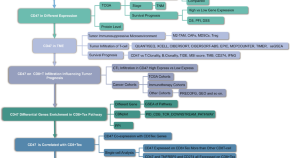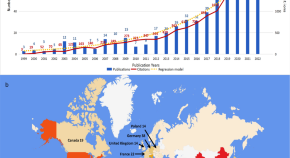Utilizing machine learning algorithms for predicting risk factors for bone metastasis from right-sided colon carcinoma after complete mesocolic excision: a 10-year retrospective multicenter study
Authors (first, second and last of 10)

Collection
Several challenges and controversies exist in the domain of clinical cancer treatment. These include therapeutic modalities to achieve better therapeutic effects in tumor treatment; the efficacy of immunotherapy based on immune checkpoint inhibitors (e.g., PD1 inhibitors) and novel Chimeric antigen receptor (CAR) T-cell therapy; the value of traditional herbal medicine as adjunctive; and whether risk factor mitigation can significantly reduce tumor mortality and improve overall survival of preoperative tumor patients. Such clinical oncology questions can be answered by pertinent data with rational and effective processing of clinical data using appropriate statistical methods.
Along with oncologists' improved understanding of study design for clinical trials, the number of publicly registered clinical trials in the ClinicalTrials.gov results database has significantly increased worldwide. Large-scale multicenter randomized clinical trials are being increasingly conducted. Software and pipelines for powerful statistical analysis have been developed to analyze the data extracted from RCTs of the same study design. Secondary analysis including network Meta-analysis can address urgent questions about which among multiple treatment modalities can achieve better treatment outcomes. In addition, clinical informatics analysis offers great potential in leveraging oncology clinical data. The Surveillance, Epidemiology, and End Results (SEER) database contains a large amount of clinicopathological data on oncology patients. A series of informatics analyses (e.g., Kaplan-Meier plot analysis, univariate and multivariate logistics regression analysis, receiver operating characteristics (ROC) curve analysis, nomogram plot analysis, and calibration plot analysis) can be performed to analyze the clinicopathological data obtained from SEER database or oncologist’ hospital cohort data. By performing these analyses, a competing risk model can be constructed, and thereby the risk factors for cancer-specific mortality (CSM) in specific cancer can be identified. The procurement of clinical oncology data is time-consuming and always requires a long follow-up, and therefore needs to be fully utilized.
Therefore, in this Topical Collection, we will collect articles focusing on using statistical and informatics approaches to analyze clinical oncology data and address significant clinical issues. Both original research and review articles are welcome.
Potential topics may include but are not limited to the following
(1) Research using meta-analysis and systemic review to compile clinical oncology-related randomized controlled trials;
(2) The application of network meta-analysis in addressing clinical oncology questions;
(3) Research with reasonable and well-planned clinical oncology trials such as single-centered/multi-centered cross-sectional studies, retrospective controlled studies, cohort studies, and randomized controlled trials;
(4) Case reports regarding a novel therapeutic approach in the treatment of a rare disease;
(5) Research aiming to construct a competing prognostic model and identify the risk factors for cancer-specific mortality in specific cancer;
(6) Retrospective studies aiming to identify the risk factors for postoperative pathological upgrading of specific cancer.
Keywords: statistical methods, meta-analysis, systematic review, clinical trials, bioinformatics approach, cancer informatics
Professor, Lanzhou University, China He is a Professor at Lanzhou University. He received his Ph.D. and M.D. degree at the Fourth Military Medical University followed by famous neurobiologist Prof. Gong Ju, a CAS member. At 2006, he joined the Institute of Neurosciences at Shanghai Jiao Tong University as an Associated Professor. At 2021, he was recruited to Lanzhou University. His lab is focused on molecular mechanism of axon regeneration, tumor epigenetics and cancer neuroscience.
PhD, Southern Medical University, China She obtained her BDS and MSc from Harbin Medical University, which is one of the most famous medical universities in China. She obtained her PhD from the University of Leipzig and was awarded the Dr. Karl Zeiss Award (the best doctoral dissertation of the University of Leipzig 2020). After that, she did two years of postdoc research at the Southern Medical University in China. As of now, she has 41 published academic papers in international Sci-indexed journals to her name, and obtained an h-index of 11.
PhD, Shandong First Medical University, China She graduated from Shandong First Medical University with a Bachelor of Clinical Medicine and a Master of Science. She received her Ph.D. from Shandong University. Afterwards, she did a two-year postdoctoral research at Fudan University. Up to now, she has published more than 30 academic papers in international scientific index journals.
PhD, University Leipzig, Germany He obtained his BDS, MDS, and PhD from the University of Leipzig, one of the oldest universities in Germany. He is currently working as an assistant professor and senior physician at the dental faculty of the University of Leipzig. He has been invited to open and lead many special issues in many journals, including MDPI, Hindawi, and Frontiers. He has an h-index of 16 and has published more than 100 papers.
PhD, Dr D Y Patil Dental College and Hospital, India She obtained her BDS from Government Dental College and Hospital, Mumbai, one of the oldest dental schools in India. She obtained an MDS in periodontology from Government Dental College and Hospital, Ahmedabad. After that, she worked as a teaching faculty in Dr D Y Patil Dental College Hospital, Pimpri, Pune, and serves as a professor. She completed the ITI Scholarship and a PhD in implant dentistry at the University of Hong Kong, where is she currently affiliated as an Honorary Clinical Assistant Professor.















































